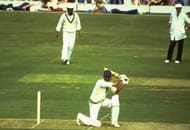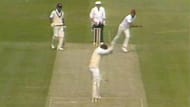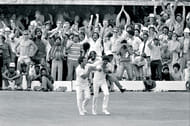There have been quite a few key moments in cricket history which have shaped the sport’s future, but not many have been as defining in recent times as India winning the 1983 World Cup. The result announced the arrival of the country on the ODI stage and started a gradual shift of the world cricket power from England to India.
Quoted by bookies with odds of 66:1 for winning the World Cup (WC), India stunned the cricketing world by defeating two-time defending champions and overwhelming favourites – the mighty West Indies – at Lord’s on June 25, 1983 to lift the trophy.
Aussie skipper Kim Hughes had suggested before the tournament began that India could be the dark horses for the trophy. But at that point of time, even the most optimistic fans of the Indian team would have struggled to believe that the team stood any chance of lifting the WC.
Despite a first-ever ODI win over the West Indies at Berbice a couple of months before, the Indian team wasn’t expected to be much of a threat in the tournament. After all, the team had won only one game in the previous two editions of the WC – against the minnows East Africa.
Road to the final
The Indian team was placed in Group B along with Australia, West Indies and WC debutants Zimbabwe. The popular opinion was that the West Indies and Australian teams would prove to be too strong for the other two sides in the group and qualify for the semifinal stage.
However, a stunning defeat of Australia at the hands of Zimbabwe in their first-ever WC match was a sign of things to come, and India showed that the win over the West Indies at Berbice wasn’t a one-off as they repeated the feat at Manchester with a 34-run win.
West Indies won all their remaining three games in the group stage while India beat Australia once and Zimbabwe twice to seal the second semifinal spot from the group. But India’s progress to the knockout stage (their first ever in WC history) wasn’t without drama.
In the game against Zimbabwe at Tunbridge Wells, the Indians were struggling at 17-5 against the bowling of Peter Rawson and Kevin Curran, and were staring at the prospect of yet another unceremonious exit from the tournament. But this was when Indian skipper Kapil Dev decided to play a spectacular knock of 175* to take the team to a score of 266-8, and ultimately a 34-run win.
The first semifinal saw India facing off against hosts England, and a fine all-round display by Mohinder Amarnath and fifties from Yashpal Sharma and Sandeep Patil helped the Indians achieve an upset win over the hosts. The West Indian side comfortably saw off Pakistan’s challenge in the other semifinal to seal a spot in the final, looking set to complete a hat-trick of World Cup wins.
Not the best of starts
The unfancied Indian team had surprised everyone by reaching the final, but no one really gave them much of a chance against the rampaging West Indies team, which was full of big stars – Viv Richards, Clive Lloyd, Desmond Haynes, Gordon Greenidge, Malcolm Marshall, Michael Holding, Joel Garner and Andy Roberts.
Realizing that they had nothing to lose, the Indian team told themselves that they had done exceptionally well to reach the final, and that they should now go out in the middle and enjoy themselves.
It wasn’t the most auspicious of starts for India as Kapil Dev lost the toss, and Clive Lloyd asked the Indians to bat first.
Sunil Gavaskar was a big name in the batting line-up despite his not-so-impressive ODI credentials, and the team hoped that he would perform and give a strong start to the innings on a tricky pitch. However, things didn’t go as per plan as Gavaskar was caught behind early by keeper Jeff Dujon off the bowling of Roberts.
Many fighting knocks, but below-par total
Gavaskar’s early dismissal saw Mohinder Amarnath, the man-of-the-match in the semifinal, join Kris Srikkanth in the middle. The duo put on a fifty run stand, with Srikkanth especially being aggressive in an attempt to counter the West Indies pace attack. Srikkanth’s knock of 38 turned out to be the highest score in the match, and Amarnath supported him with a score of 26.
Sandeep Patil chipped in with a quick-fire 27 and Kapil Dev began aggressively, seemingly with an intention to repeat his Tunbridge Wells heroics, but he was dismissed soon by Larry Gomes. India kept losing wickets at regular intervals, but the tail wagged with some crucial runs (which ultimately proved to be the match-winning difference for India).
The Indian team was dismissed for a paltry score of 183 with more than five overs remaining, and any faint hopes of a surprise win seemed to diminish even further.
The ‘banana-skin’ delivery
India required early wickets to still be in contention in the game, and they had to face the challenge of the West Indies’ openers Greenidge and Haynes. And they got the crucial early breakthrough via a famous delivery by Balwinder Sandhu.
Sandhu bowled a surprise in-swinger (famously called the banana-skin delivery) from close to the stumps. Greenidge shouldered arms expecting the ball to move away, but instead the seam made the ball come in and clip the top of the off-stump.
The West Indian batting line-up still posed a formidable challenge for the Indian bowlers, but the early wicket of Greenidge and later Haynes (by Madan Lal) restricted the batting side to 50-2.
The most famous running catch in cricket history
The dismissal of Greenidge brought Viv Richards to the crease, and the player set off in majestic fashion, seemingly continuing from where he had left in the 1979 WC final. He had scored 33 runs off 27 deliveries and looked set to complete the run-chase swiftly before he mistimed a hook off the bowling of Madan Lal.
Despite the mistimed shot, it appeared that the ball would land safely, but Kapil Dev had other plans. He ran all the way from mid-on to midwicket to take a brilliant catch and send the dangerous Richards back to the pavilion.
The dismissal turned out to be the game-changer, and the running catch by the skipper is considered by many as the moment which changed the fortunes of Indian cricket forever.
A mighty collapse, and history is made
Richards’ dismissal sparked off a batting collapse as West Indies slipped from 57-2 to 76-6 in quick time with Madan Lal, Sandhu and Roger Binny among the wickets. Clive Lloyd, Larry Gomes and Faoud Bacchus were all dismissed cheaply.
Jeff Dujon and Malcolm Marshall put up some resistance and threatened to bring their team back into the game, before Amarnath struck again by dismissing both in quick succession. Kapil Dev dismissed Andy Roberts soon after, and history was made when Amarnath trapped Michael Holding lbw to seal a famous win for India by 43 runs.
Amarnath won his second successive man-of-the-match award for his all-round display (26 and 3-12), and India got to lift the World Cup exactly 51 years after playing their first international game at the same venue.
The win led to an increase in popularity of ODIs in India, and the team consolidated on the World Cup win by winning the Asia Cup and World Championship of Cricket in the next two years. The next edition of the World Cup was played in the Indian sub-continent, which was the first time it was hosted outside England.
Not only was the 1983 World Cup final a perfect modern-day example of a “David vs Goliath” story, it also marked a major shift in the world cricket order, both on the field and off it, with West Indies and England losing their influence in their respective strongholds.
After years of being a sleeping giant, India had finally woken up and was a major force to reckon with in world cricket.
Brand-new app in a brand-new avatar! Download Cric Rocket for fast cricket scores, rocket flicks, super notifications and much more!




